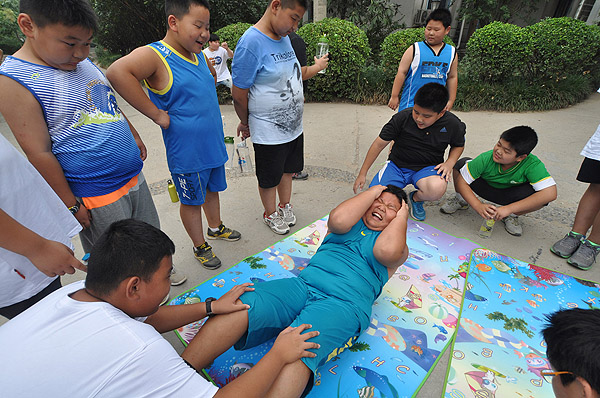 |
|
A boy struggles while doing a sit-up at a summer camp to tackle child obesity in Zhengzhou, Henan province, on July 14, 2013. [Photo/Agencies] |
Global food and nutrition security are important issues to consider, both now and for the future.
The world population is likely to reach 9.6 billion in 2050, from 7.3 billion at present. This means enough nutritious food should be available for an additional 2.3 billion people within the next 35 years. In addition, provision also has to be made for 795 million people, approximately 1 in 9 of the global population, who do not have access to adequate food to lead a healthy active life now.
With the implementation of proper policies, strong political will, continued advances in science and technology and good agricultural and food management practices, global food security can be achieved in the coming years. However, nutritional security needs to receive similar levels of attention.
There are two important aspects of nutritional security: obesity and malnutrition.
Obesity has now become a global problem. Globally there has been a steady increase in the number of obese people. The increased consumption of energy-rich food that has high sugar and saturated fat content but few nutrients, as well as reduced physical activity, have contributed to a threefold increase in obesity rates in some parts of the United States, the United Kingdom, Eastern Europe, the Middle East, China and Australasia.
Increasing rural-urban migration in developing countries is aggravating obesity. There are now twice as many obese people in developing countries as in developed ones. Rural people are self-reliant in obtaining food and eat traditional diets that are rich in grains, fruit and vegetables, but low in fat and sugar. When they migrate to urban areas, they engage in less physical activity and increase their intake of sugar, refined grains and fats. Their dietary profile moves from traditional and more nutritious diets to a more aspirational urban diet. The communication and information revolution has contributed to this with the globalization of an aspirational, ill-conceived "Western" diet.
But in terms of nutritional security, numerous developing countries are facing an equally serious problem in terms of malnutrition. According to United Nations' estimates, nearly two-thirds of malnourished people of the world are in Asia. Although the highest prevalence is in Sub-Saharan Africa where 1 person in 4 is malnourished.
China has made remarkable progress in combating malnutrition. The just released "2015 Report on Chinese Nutrition and Chronic Diseases", based on data from 2002 to 2012, shows adult malnutrition was 6 percent in 2012, a decline of 2.5 percent over a decade. Stunted growth for children and adolescents between the ages of 6 and 17 was 3.2 percent, a reduction of 3.1 percent over the decade. Wasting was somewhat higher at 9 percent, but this was still a decline of 4.4 percent over the 10 years.
Anaemia has been historically been a serious problem in China, but this has shown a remarkable reduction, falling from 20.1 percent to 9.7 percent, over the same period. Malnutrition, however, continues to be serious in rural areas, and China needs to attach more importance to it in its 13th Five-Year Plan (2016-20).
The problems in the developing world are not only because of malnutrition, gender discrimination, poor health education and literacy; other public health issues also play a role. For example, open defecation is still widely practiced in many countries. This contributes to an unhealthy environment where children live and play.
Open defecation spreads diarrhoea and other diseases, as well as worms and parasites. These make it difficult for children to absorb nutrients even when food is plentiful. The evidence shows a strong correlation between open defecation and underweight children.
Countries need to give proper emphasis to nutrition security. No country can realize its full potential if the bodies and minds of its young people are stunted because of a lack of nutrients.
Peter Brabeck-Letmathe is chairman of the board of Nestlé, Vevey, Switzerland. Asit K. Biswas is distinguished visiting professor at Lee Kuan Yew School of Public Policy, Singapore.

I’ve lived in China for quite a considerable time including my graduate school years, travelled and worked in a few cities and still choose my destination taking into consideration the density of smog or PM2.5 particulate matter in the region.